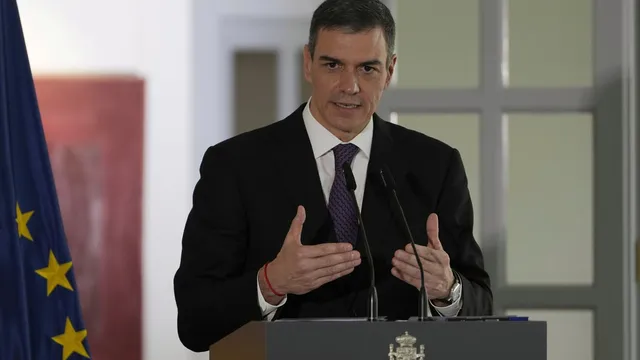
Spain rejects NATO's 5% defense spending target as unreasonable
2025-06-19 12:51- Spain has formally declined NATO's proposal for 5% GDP defense spending, labeling it as unreasonable.
- The Spanish government is committed to raising its defense budget to meet a previous target of 2% of GDP by 2025.
- This decision highlights the conflicting priorities within NATO as member states adjust their defense strategies amid rising geopolitical tensions.
Express your sentiment!
Insights
In a significant diplomatic move, Spain has decided to reject NATO's proposal to allocate 5% of its GDP for defense expenditures. This announcement was made by Spanish Prime Minister Pedro Sánchez in a letter to NATO Secretary-General Mark Rutte, indicating that such a commitment would be deemed 'unreasonable.' The NATO summit in The Hague was set to discuss the proposal, which Spain believes would not align with its current financial strategies and welfare obligations. Most NATO allies are leaning toward endorsing this higher expenditure, emphasizing the need for robust defense mechanisms amid growing geopolitical tensions. Sánchez highlighted that Spain's military budget was already planned to increase to meet NATO's previous commitment to spend 2% of GDP by 2025, aided by an additional allocation of €10.5 billion. However, the proposed increase to 5% would place undue pressure on Spain's public services and economic stability, according to his statements. As the lowest spender in NATO, Spain currently spends less than 2% of its GDP on defense, a situation that Sánchez suggested does not adequately reflect the country’s defense needs or strategic commitments. Calls for a more flexible defense spending formula surfaced, with Sánchez proposing alternatives that could make the targets optional or allow Spain to be exempt from specific requirements. This approach presents a divergence from the strategy adopted by U.S. allies, who, influenced by previous commitments made to President Donald Trump, are preparing to significantly increase their military expenditures. Similar commitments have already been made by countries like Poland and the Baltic states, reinforcing the pressure on Spain as it navigates its defense spending plans. The aftermath of Russia's full-scale invasion of Ukraine in February 2022 has catalyzed a realignment of NATO defense priorities, pushing for increased military investment among member states. In light of this, the emphasis on greater contributions—initially set at 2% and now suggested to be raised to 5% for many members—points to the escalating necessity of collective defense readiness against potential threats. Though Spain expresses its commitment to NATO, it remains firm in its stance against what it perceives as unrealistic financial demands while seeking to uphold the integrity of its welfare state.
Contexts
NATO has established critical defense spending requirements aimed at ensuring the alliance's readiness and capability to respond to various security challenges by 2025. As part of a collective commitment made at the 2014 Wales Summit, NATO member countries agreed to aim for a minimum defense spending level of 2% of their Gross Domestic Product (GDP) by 2024. This benchmark reflects the need for countries to allocate sufficient resources towards their defense capabilities, given the increasing complexities of global security threats. The 2025 targets are not merely a continuation of this commitment but represent a clarification and intensification of NATO's collective defense strategies in response to emerging geopolitical tensions, particularly in Eastern Europe and beyond. In recent years, the geopolitical landscape has been dominated by rising threats from state and non-state actors, cyber warfare, and the resurgence of systemic competition among major powers. The report emphasizes that NATO's efficacy as a deterrent and defense organization hinges on its members meeting the outlined spending requirements. Consistency in defense investment is not only crucial for maintaining interoperability among NATO forces but also for ensuring that member states are equipped with the latest technologies and capabilities necessary to counteract evolving threats. Countries that fail to meet the minimum spending threshold risk limiting their contributions to the collective defense, thereby undermining NATO's overall strategic posture. Moreover, the report highlights the importance of not just monetary contributions but also the qualitative aspect of defense spending. It argues for investments in innovative technologies, modernization of armed forces, and enhancement of joint military exercises, which are all essential for maintaining a formidable defense alliance. NATO urges member nations to prioritize areas such as cyber defense, intelligence, surveillance, and reconnaissance (ISR), and advanced military capabilities that would foster a stronger collective defense architecture. It becomes imperative for defense budgets to reflect a strategic vision that aligns with NATO's goals and regional security priorities. Coordination among NATO allies remains essential for maximizing defense spending's effectiveness. Collective efforts through the NATO Defense Planning Process facilitate transparency and collaboration on defense strategies. Furthermore, the report notes the critical need for nations to share best practices, pool resources, and engage in joint procurement programs to achieve greater operational efficiency. Ultimately, by aligning individual national defense strategies with NATO’s goals, member countries not only enhance their own security but contribute to the larger aim of a secure and stable Euro-Atlantic area.